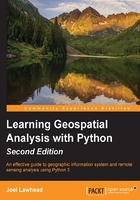
Overviews
Overview data is most commonly found in raster formats. Overviews are resampled, lower resolution versions of raster datasets that provide thumbnail views or simply faster loading image views at different map scales. They are also known as pyramids and the process of creating them is known as pyramiding an image. These overviews are usually preprocessed and stored with the full resolution data either embedded with the file or in a separate file. The compromise of this convenience is that the additional images add to the overall file size of the dataset; however, they speed up image viewers. Vector data also has a concept of overviews, usually to give a dataset geographic context in an overview map. However, because vector data is scalable, reduced size overviews are usually created on the fly by software using a generalization operation as mentioned in Chapter 1, Learning Geospatial Analysis with Python.
Occasionally, vector data is rasterized by converting it into a thumbnail image, which is stored with or embedded in the image header. The following image demonstrates the concept of image overviews that also shows visually why they are often called pyramids:
